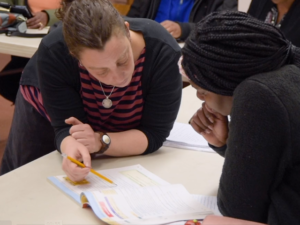Facts and Figures That Convey the Importance of Adult Literacy
Written by Amy Letteney, First Literacy Development Director
 September marks the unofficial start of back-to-school season and some important dates that bring to attention the importance of literacy.
September marks the unofficial start of back-to-school season and some important dates that bring to attention the importance of literacy.
September 8 is International Literacy Day; it observes the importance of literacy as a basic human right. September 18 to September 24 is Adult Education and Family Literacy Week, which promotes understanding and support for the role of adult education in every community’s overall health.
The dates are important to recognize and the facts and figures behind the importance of adult literacy can help you tell the story to your friends, family, and local government.
There are several recent statistics on the importance of literacy that bring to light issues that require attention and solutions that the Adult Basic Education community and First Literacy are undertaking to address the inequity.
Literacy Impacts the Economy
Issue: Data from ProLiteracy shows that bringing all adults to a sixth-grade reading level will help our communities and nation’s economies grow, with a potential $2.2 trillion added to U.S. income totals.
Solution: Community-based adult education programs understand the specific needs of their students. The combination of free professional development workshops, innovation grants and tuition scholarships, which support adult students and their educators, results in First Literacy’s ability to impact more than 6,000 Massachusetts adult learners annually. Making it possible for adult learners in Massachusetts to further their education influences the local economy, allowing these individuals to obtain higher paying jobs in a variety of fields.
Literacy Creates Opportunities for English Language Learners
Issue: Findings from Pew Research Center reveal that the U.S. has the world’s largest immigrant population, holding one-in-five of the world’s immigrants, only half (53%) are proficient English speakers.
Solution: Over 90% of First Literacy scholars were born outside of the United States and many did not speak any English when they arrived in the U.S. First Literacy scholarships remove the financial barrier to education that many immigrants face when coming to the United States – making it possible to pursue individual educational goals and contribute to society.
Literacy Affects Recidivism
Issue: According to Prison Policy Initiative, there are almost 2 million people in the criminal justice system in the United States. Seventy-five percent (75%) of those in prison did not graduate high school, however if they are able to increase their education levels, they are 43% less likely to return to prison [ProLiteracy].
Solution: There are many programs underway to assist those exiting prison as they return to their home communities. First Literacy recently funded the Charlestown Adult Education Center Youth Re-entry Program. The program is a comprehensive re-entry program for incarcerated and court-involved/at risk youth (ages 16 – 30) who need a HiSET/GED certification or to improve language proficiency. The program includes cognitive behavioral therapy group sessions with young men emerging from the justice system. Some are recovering from addiction; others have behavioral and/or emotional challenges; all are holding down jobs while pursuing their educational goals. The program appears to be an unqualified success, as demonstrated by the progress made by participants.
Adult Literacy Programs Lack Public Funding
Issue: Contrary to the importance of adult literacy, in recent years federal funding has declined for community-based programs. Recent data shows that only $590 in federal funds are allocated per adult learner, those with the most barriers to employment and literacy. This amount is stark when compared to roughly $10,000 per pupil for elementary education [COABE]. At the present levels of public funding, less than 10 percent of adults in need are receiving services [ProLiteracy].
Solution: Adults who have broken the cycle of low literacy would not be where they are today without the hard work of the educators who provide crucial Adult Basic Education classes. However, a lack in public funding makes it difficult for community-based education organizations to continue to provide classes and programming for adults working towards a high school degree or looking to gain English proficiency. First Literacy grants offer an alternative to public funding allowing innovative Adult Basic Education organizations in Massachusetts to apply for grants of up to $15,000.
The Power of Literacy
Literacy is so much more than the ability to read and write. Literacy impacts adults, families, communities, and our nation. This September, during a month filled with literacy awareness holidays, join First Literacy and the Adult Basic Education community in celebrating adult learners and the power of literacy.
Consider making a donation to First Literacy during the month of September in honor of Literacy Awareness Month. Help First Literacy raise $3K by September 30. Your donation will help fund two scholarships for a recent graduate of a Massachusetts Adult Basic Education or English language program who plans to continue to vocational training or higher education. Help First Literacy change lives through the power of education!
